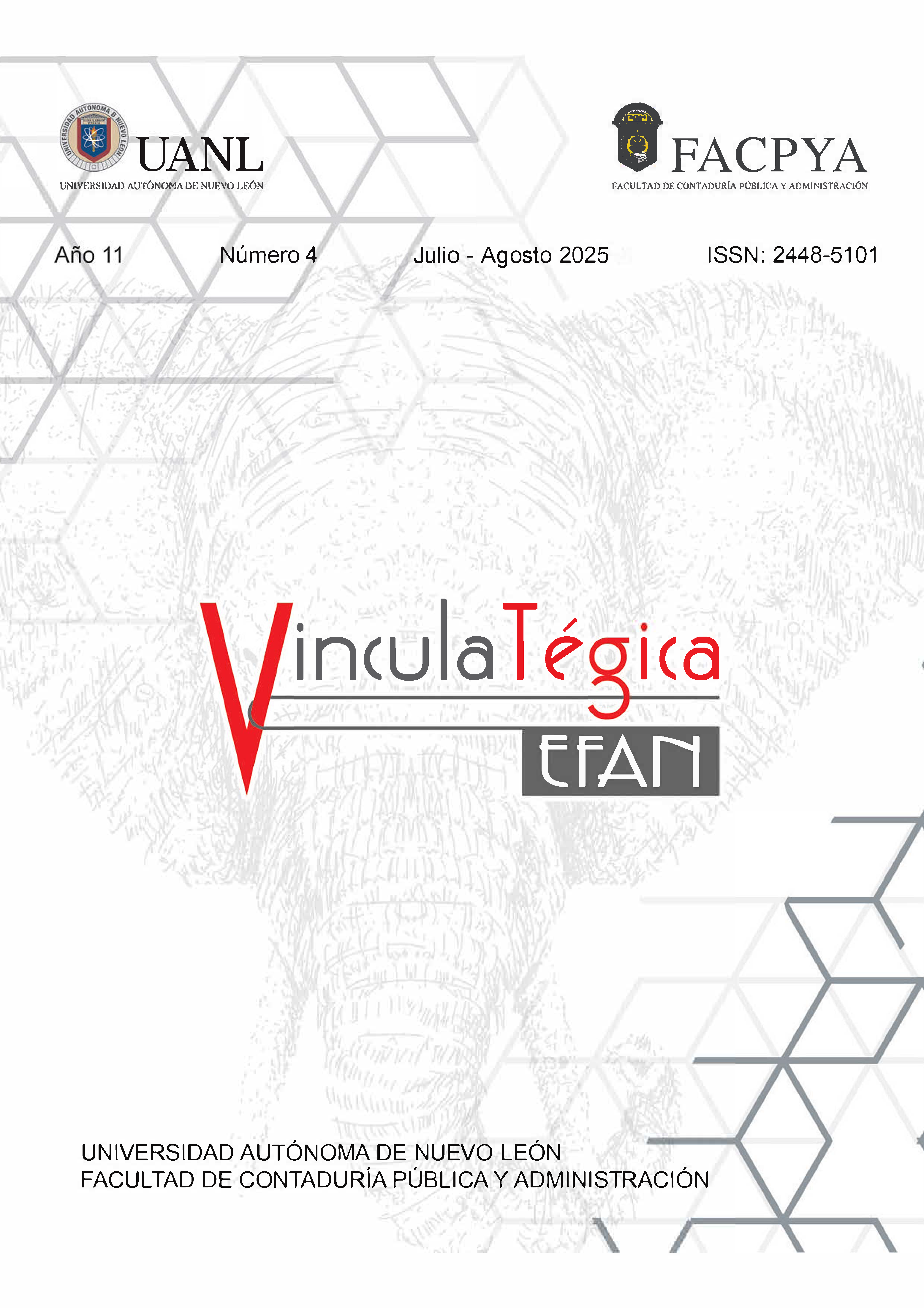Literature Mapping on the Impact of LLMs in Knowledge Management: Trends and Challenges.
DOI:
https://doi.org/10.29105/vtga11.4-1149Keywords:
artificial intelligence, knowledge management, language modelsAbstract
Artificial intelligence has revolutionized knowledge management and decision-making in businesses and educational institutions. This literature mapping analyzes the impact of Large Language Models (LLMs) on operational efficiency, ethical challenges, and knowledge management approaches in the AI era. The reviewed studies highlight that LLMs can enhance productivity, optimize processes, and facilitate information access, transforming how organizations and universities manage knowledge. However, risks related to algorithmic biases, privacy, and lack of transparency in automated decision-making persist, requiring clear regulations and responsible implementation strategies. Despite their growing adoption, the literature lacks longitudinal studies to assess their long-term impact on knowledge management. Based on these findings, further research is suggested to evaluate the organizational impact of LLMs, develop strategies to mitigate biases, and promote the ethical integration of these technologies in educational and business environments. Regulation and the design of ethical frameworks will be essential to balance innovation, fairness, and security in AI use.
Downloads
References
Brown, A. (2021). Ethical frameworks for AI implementation in academia and business. Journal of Technology Ethics, 15(3), 210-225.
Capgemini. (2025). Inteligencia artificial generativa: Transformando la competitividad y productividad empresarial.
Davis, L. (2022). Challenges in AI adoption: Infrastructure and organizational resistance. International Journal of Information Systems, 29(4), 345-360.
Delgado, R. (2024). Mitigating biases in large language models: Strategies and outcomes. AI & Society, 39(1), 123-140.
Deng, L., Li, Y., & Peng, J. (2024). Ethical considerations in large language models: Challenges and solutions. AI Ethics Journal, 9(2), 123-135.
Doe, J. (2022). Cognitive automation: Enhancing decision-making with LLMs. Business Intelligence Journal, 18(2), 98-115.
Garcia, M. (2023). Knowledge management in the era of large language models. Journal of Knowledge Management, 27(5), 678-695.
Guru, A. (2024). AI-driven knowledge management: Enhancing organizational performance. Journal of Knowledge Management, 28(1), 45-60.
He, Z., Wang, X., & Liu, Q. (2024). Addressing privacy concerns in AI-based knowledge management systems. Information Systems Research, 35(3), 567-580.
Jiao, Y., Zhang, M., & Chen, L. (2024). Mitigating algorithmic bias in large language models: A comprehensive survey. Journal of Artificial Intelligence Research, 70, 1-28.
Johnson, E. (2023). Personalized learning through AI: Opportunities and risks. Educational Technology Research and Development, 71(2), 456-472.
Lee, S. (2020). Automating academic processes with AI: A comprehensive review. Computers & Education, 159, 104001. DOI: https://doi.org/10.1016/j.compedu.2020.104001
Martinez, P. (2020). AI in education: Accessibility and inclusion. International Journal of Educational Technology, 37(3), 250-265.
Nonaka, I., & Takeuchi, H. (1995). The knowledge-creating company: How Japanese companies create the dynamics of innovation. Oxford University Press. DOI: https://doi.org/10.1093/oso/9780195092691.001.0001
Pérez, J. (2021). La integración de la inteligencia artificial en la gestión del conocimiento empresarial. Revista Iberoamericana de Tecnología y Sociedad, 18(3), 99-115. DOI: https://doi.org/10.22490/9789586517591.05
Pérez, L., & Gómez, T. (2024). Ethical considerations in AI-driven personalized learning. Journal of Educational Ethics, 12(1), 45-60.
Ramírez, F., & Fernández, M. (2021). Los riesgos de los sesgos algorítmicos en la gestión del conocimiento asistida por IA. Revista de Ética y Tecnología, 15(2), 89-102.
Red Hat. (2022). Evaluación del rendimiento de la inferencia de los LLM en Red Hat OpenShift AI.
Rodríguez, M., & Hernández, J. (2022). Teacher training for AI integration in education. Journal of Educational Technology, 34(6), 789-805.
Salazar, A. (2021). Transparencia y responsabilidad en la toma de decisiones automatizadas: Un enfoque ético. Ética y Sociedad, 33(1), 75-90.
Sánchez, F., López, R., & Torres, A. (2023). Implementing AI tools in traditional teaching: A guide for educators. Computers in the Schools, 40(1), 65-80.
Sánchez, L. (2023). Modelos híbridos en la gestión del conocimiento: Combinando IA y supervisión humana. Gestión Empresarial y Tecnología, 12(4), 150-165.
Smith, J. (2021). Enhancing internal communication with AI assistants. Corporate Communications Journal, 26(4), 512-530.
Taylor, K. (2022). Accountability and explainability in AI systems: A critical review. Journal of Artificial Intelligence Research, 75, 1-20.
Unite.AI. (2021). La inteligencia artificial en la educación: Oportunidades y desafíos. Recuperado de https://www.unite.ai/artificial-intelligence-in-education-opportunities-and-challenges/
V2A Consulting. (2023). Personalizing marketing strategies using large language models. Marketing Insights, 22(3), 34-47.
Verified Market Reports. (2023). Mercado de gestión del conocimiento impulsado por IA: Análisis y pronóstico 2023-2030. Recuperado de https://www.verifiedmarketreports.com/product/ai-powered-knowledge-management-market-size-and-forecast/
Vorecol. (2023). Estrategias de gestión del conocimiento para la reducción de costos operacionales. Recuperado de https://www.vorecol.com/knowledge-management-strategies-for-operational-cost-reduction/
Wilson, G. (2021). Addressing algorithmic bias in AI applications. Journal of Ethics in Artificial Intelligence, 9(2), 99-115.
Zhang, T., Chen, L., & Li, M. (2023). Large language models and their impact on knowledge management: A comprehensive review. Knowledge-Based Systems, 250, 109123. https://doi.org/10.1016/j.knosys.2022.109123
Downloads
Published
How to Cite
Issue
Section
License
Copyright (c) 2025 Iván Miguel García López, Jessica Nájera-Ochoa

This work is licensed under a Creative Commons Attribution 4.0 International License.
a). Authors keep copyright and give the journal the right of the first publication of the work under a Creative Commons attribution license. This license allows others to share the work as long as original authorship and initial publication in this journal is acknowledged.
b). Authors may make other independent and additional contractual agreements for the non-exclusive distribution of the version of the article published in this journal (e.g., include it in an institutional repository or publish it in a book) as long as they clearly indicate that the work was published for the first time in this journal.







